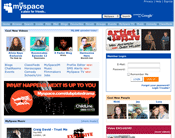
In November, UK market leader Facebook (according to Hitwise figures), and third-ranked MySpace launched separate targeted advertising products.
Meanwhile Google has launched OpenSocial, an open standard for software development for social networking sites. This is expected to reduce the cost for marketers by creating applications for end users. MySpace, Bebo, Oracle, Xing, LinkedIn, Plaxo, Hi5, iLike, and Google's Orkut have signed up.
The marketing opportunity for social networking is immense. Facebook is the fourth most visited URL in the UK, behind Google, eBay and Windows Live Mail (the new version of Hotmail), according to Hitwise.
The sites are also important as a referral to other sites, with Hitwise figures suggesting the UK internet traffic online retailers receive from social networking sites rose 153 per cent from December 2006 to September 2007. Online auction sites are the biggest beneficiaries, followed by traditional retail sites.
Jon Pollard, head of digital at agency Gyro International, said the prospects for social networking as a direct marketing channel are huge if sites can overcome the resistance of users who may regard advertising as intrusive.
"The potential is huge, given the number of users," he said.
Pollard is impressed with Facebook's ad system, which lets advertisers set up a profile page and place ads into users' news feeds. Users can become "fans" of businesses and act as a referral by sharing information about a firm via their Facebook page.
On launch, Facebook added more than 100,000 pages from various companies and brands to the system. Coca-Cola, Blockbuster, Dove and The New York Times have already signed up.
Meanwhile, News Corporation-owned MySpace has launched "Hyper Targeting", which will place ads on users' profiles on the basis of their interests and tastes, though they can opt out.
Procter & Gamble, Microsoft and Ford are said to be interested in the service, which will look at what users say in their profiles and their behaviour online.
Ross Taylor, managing director of digitaltmw, said the improved targeting was positive, but there were limits to how narrowly an advertiser would want to focus. He added users regard these sites as their personal space, so advertisers need to tread carefully.


.jpg)


.jpg)